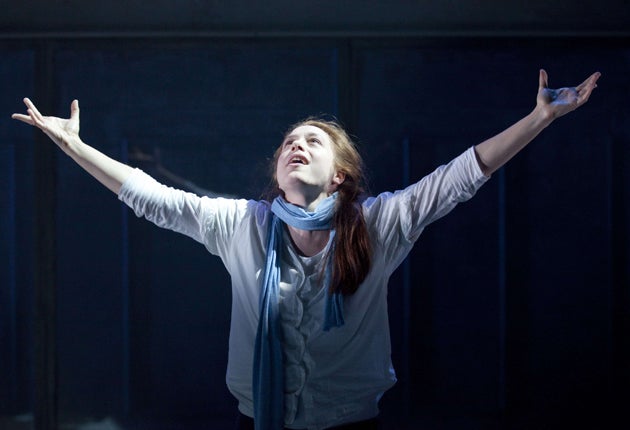Polar Bears, Donmar Warehouse, London

Mark Haddon made his name with The Curious Incident of the Dog in the Night-Time, a novel about the break-up of a marriage as seen through the eyes of a teenager with Asperger's syndrome. When I heard that he had written Polar Bears, a play about the stresses of loving a female with a bipolar disorder, my first cynical reaction was to wonder whether he has started to collect disorders for creative exploitation across the art forms.
My misgivings were exacerbated by the fact that I myself am bipolar. My case is not nearly as severe as that of Kay, the protagonist of his play, which is now unveiled in Jamie Lloyd's vigorous, sometimes serio-jokey, sometimes bruised and poetic production.
In his debut stage drama, Haddon proves that he can create comic dialogue that sometimes has an Alan Bennett ring; he can shape scenes so that they spring surprises; he can tell a story out-of-chronological-sequence so that by the back-and-forth jumps and juxtaposition, episodes sometimes contradict each other or shift from the objective to the subjective. This last talent is useful for a play that, like the heroine, is in two minds about what actually happens as events in the outside world and in her head conflict.
The play starts with a confrontation between John, Kay's kindly, sorely tried philosopher husband (Richard Coyle) and her brother, Sandy (Paul Hilton), who has always impatiently believed that she should just grow up.
Polar Bears is at its best when it dramatises the burden borne by people who love and care for bipolar sufferers. The problem, though, is that Haddon's play deals in faintly lurid extremities when the real dramatic interest in the condition lies, to my mind, in the greyer areas. For example, like a lot of bipolar people, Kay – played by Jodhi May with a keen feel for her excitability and hectic allure – is given, when on a high, to bombastic delusions about her talents, in this case for art. She leads her husband to half-believe that she is on the short list for the Carnegie Medal for a children's book she has written and illustrated. But in a melodramatically staged scene, with pages cascading through a symbolically wrecked ceiling, her mother (Celia Imrie) tells John with the terrible truth. Kay has no talent whatsoever. Her illustrations are just childish scrawls.
To 22 May (0844 871 7624)
Join our commenting forum
Join thought-provoking conversations, follow other Independent readers and see their replies
Comments
Bookmark popover
Removed from bookmarks